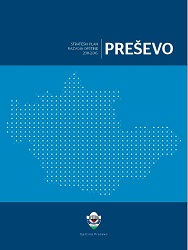
STRATEGIC DEVELOPMENT PLAN OF THE MUNICIPALITY OF PREŠEVO 2011-2016
STRATEŠKI PLAN RAZVOJA OPŠTINE PREŠEVO 2011-2016
Keywords: development; Preševo; muncipality; strategic planning;
More...
Keywords: development; Preševo; muncipality; strategic planning;
More...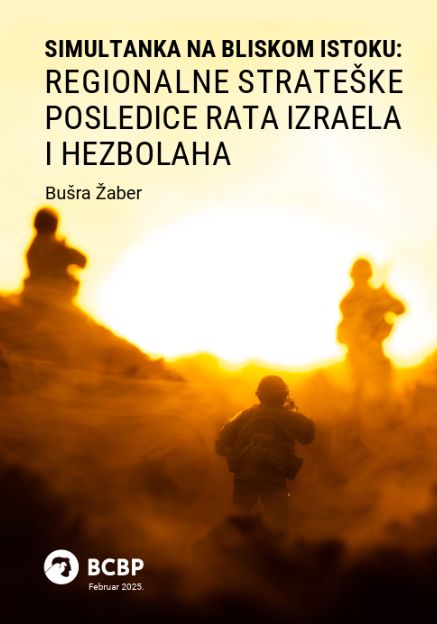
Keywords: Middle East: Israel-Hezbollah War
Since the end of the First World War and the collapse of the Ottoman Empire, the symbol of wars, conflicts, invasions and instability has been the Middle East. However, the events in this region are not happening in isolation from the rest of the world. Domestic problems intertwine with regional dynamics, and vice versa, while international actors strive to preserve interests and expand their influence. This means that the consequences of developments in one country can be reflected in the entire region, with the possibility of causing a number of stacked dominoes to fall.
More...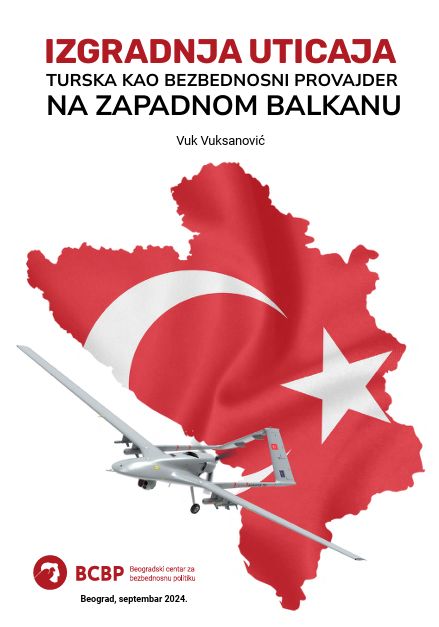
Keywords: Serbi; Turkey; Kosovo; Kosovo Security Forces (KSF); UN Security Council Resolution 1244; NATO; Kosovo Force (KFOR)
In July 2023, Serbian Minister of Defense and now Serbian Prime Minister Miloš Vučević publicly accused Turkey of training, arming and holding military exercises with the Kosovo Security Forces (KSF), Kosovo's crisis response formation, with the explicit aim of transforming the KSF into a full-fledged army by 2028. It is a process that Serbia opposes, continuing to invoke UN Security Council Resolution 1244, which does not accept any other armed formation on the ground except the NATO peacekeeping force, the Kosovo Force (KFOR).
More...
Keywords: European Union; United States; China; economic confrontation; green technology; lithium
The struggle between the European Union, the United States and China for dominance in the new markets of specific technologies could become the most important topic in the next two to three decades, which could overshadow all the military conflicts currently taking place in the world. It is conducted simultaneously on several fronts: there is artificial intelligence, new principles of industrial production (for example, the use of robots or additive technologies), space exploration, and much more. This report deals with the political and economic confrontation of the three parties in the field of the green technology industry and draws certain conclusions about the consequences it could have for Serbia. The role of Serbian reserves of lithium and other minerals important for the latest high-tech industry could affect the position of the country in the world in general, and especially its importance when it comes to the European Union.
More...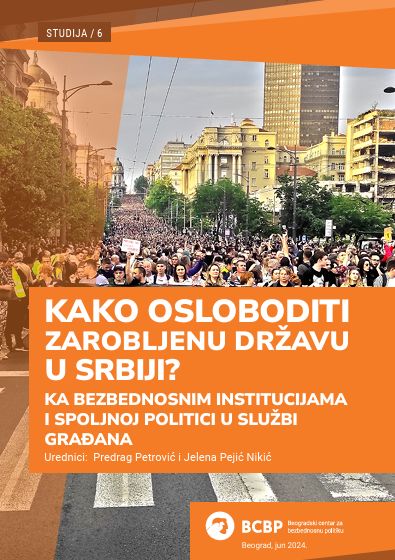
Keywords: Serbia; hybrid political regime; Security institutions; democracy; security intelligence services; police; private security companies
Numerous findings of domestic and foreign research organizations unequivocally indicate that Serbia is a captive state with a hybrid political regime. Security institutions play a major role in the capture of the state and the collapse of democracy in Serbia, as well as in preserving this state of affairs. The Belgrade Center for Security Policy (BCBP) was among the first organizations in Serbia to notice this negative trend, and during 2019 and 2020 it investigated and documented in detail the role of the security intelligence services, the police, the army and private security companies in state capture, as well as the impotence of supervisory and control authorities.
More...
Keywords: gender equality; social diversity; eminist Foreign Policy (FSP)
In the last few years, more and more decision-makers and policy-makers have followed the tireless activities of gender equality advocates: there is a strong interest in feminist views and efforts for gender equality, at least verbally. In its 2021 coalition agreement, the German government announced that it wanted to "strengthen the rights, resources and representation of women and girls globally and support social diversity." "In line with Feminist Foreign Policy" (Bundeserigung 2021), building on the Feminist Foreign Policy (FSP) model first introduced by the Swedish Government in 2014. On International Women's Day 2023, Slovenia also verbally committed to the FSP, as one of the last countries to announce a feminist approach to foreign policy and the first in Central and Eastern or Southeastern Europe.
More...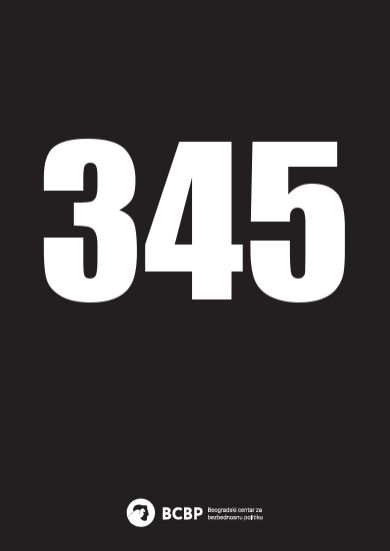
Keywords: Serbia; gun control; violence;
After the multiple murders that took place on May 3 and 4, 2023, the Government of Serbia adopted a series of measures aimed at better gun control and improving safety in schools and among young people. Measures related to firearms are more numerous and implemented to a greater extent than others. However, the levels of violence have not been reduced because these measures do not affect their causes. The public call for the surrender of weapons gave results in terms of a large number of weapons collected, but the question arises as to why the previous actions were not so successful. It is also questionable why there are currently no campaigns that would educate citizens on the topic of the dangers of weapons and how to dispose of them.
More...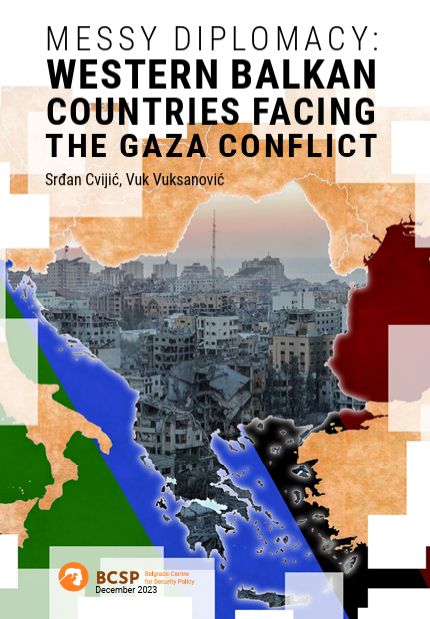
Keywords: Gaza Conflict; Russian invasion of Ukraine; Western Balkans; UN General Assembly; Hamas
The ongoing war that Israel is waging in Gaza against Hamas is one of the most consequential conflicts with serious political implications worldwide. The Gaza conflict has already diverted the world’s attention from what has been the most dominant international conflict in the past year and a half: the Russian invasion of Ukraine. Many countries in the Western Balkans are conflicted about what diplomatic stance to take on the Gaza war, primarily whether they should support Israel or Palestine or remain neutral since their decision-making will have to balance their domestic public, as well as their ties with Israel, Muslim countries and, most importantly, the US and the EU. The vote taken on October 26 in the UN General Assembly (hereinafter: UNGA) on the resolution that called for a truce between Israel and Hamas with a strong emphasis on humanitarian factors demonstrated how conflicted the Western Balkan countries were on the current conflict in Gaza.
More...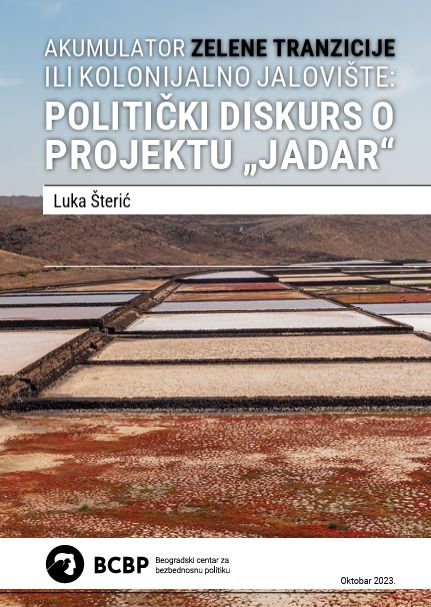
Keywords: "Jadar" project; Serbia;
The aim of this study is to analyze the political debate regarding the "Jadar" project. The study presents the development of the debate, key actors and dominant discourses that formulated it. The first part of the work is dedicated to understanding the wider context and importance of the project in Serbia and globally. In the second part, the three phases of the development of the discourse on the project "Jadar" will be presented. Then the actors and narratives that guided the political debate will be analyzed in more detail. Finally, in the last part, we will look at how the debate affected the political arena in Serbia, as well as the possible future of the discourse on this project and environmental topics in general.
More...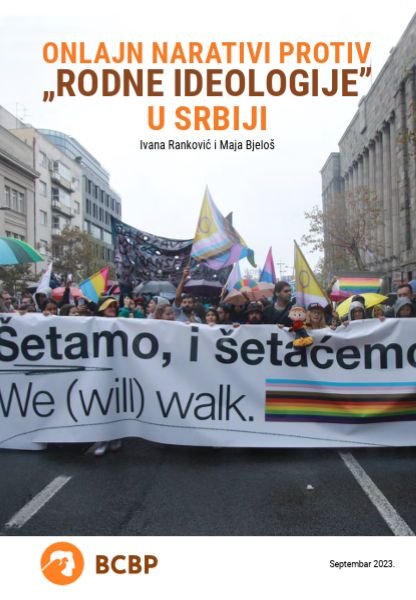
Keywords: Serbia; anti-gender social movement; social networks
In Serbia, conservative intellectuals, nationalists, populists, homophobes, right-wing parties and groups have united in the last five years to form a new anti-gender social movement that enjoys strong support from religious organizations. Presenting "gender ideology" as a threat to national identity and describing themselves as protectors of "traditional Serbian values", these actors have become active in the media with national coverage, on the Internet and social networks, where they spread and promote anti-gender discourse, often by sharing misinformation.
More...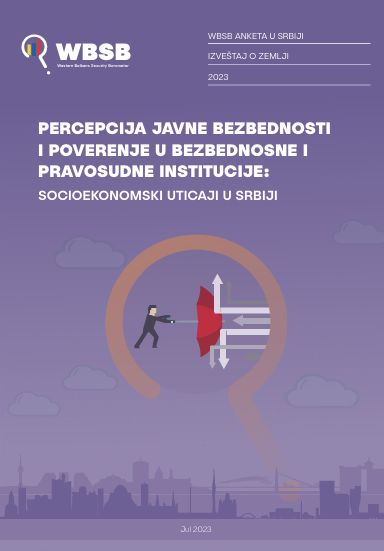
Keywords: public opinion survey; Serbia; public security; judicial institutions; national security; personal security
This analysis is based on a public opinion survey conducted in Serbia in 2022. The aim of this research was to investigate citizens' perception of public security and trust in security and judicial institutions in Serbia. The perception of public security is divided into issues of national security and personal security.
More...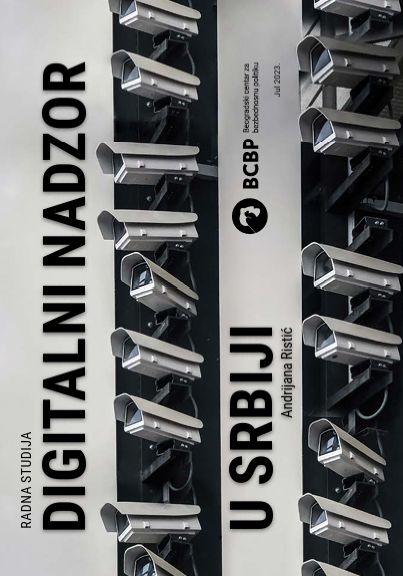
Keywords: Digital surveillance; Serbia; automatic data collection
The increasing reliance of citizens on digital technologies and devices has influenced the fact that states and private actors increasingly reach for various systems and tools for digital surveillance of citizens. Thus, high-resolution cameras, artificial intelligence and programs for biometric recognition, and tools for automatic data collection from the Internet as well as intrusive software for monitoring mobile phones have become the everyday reality of citizens around the world.
More...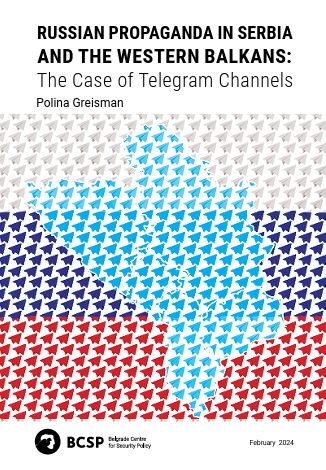
Keywords: Telegram; Russian media; Serbia; Russian government; propaganda
This study is based on the analysis of open data obtained from the Internet, dealing with Telegram channels that are directly connected to official Russian media. Serbia is no exception to the list of countries whose internal affairs found themselves on the receiving end of Russian government interference. However, due to the friendly relations between Russia and Serbia, these facts are rarely made public. Also, not all of them are obvious, at first glance, as propaganda and interference. That is why we will look at this issue in this study and, using the example of Serbia, find out what methods of propaganda and intervention Russia is using in a country that can be described as “friendly.”
More...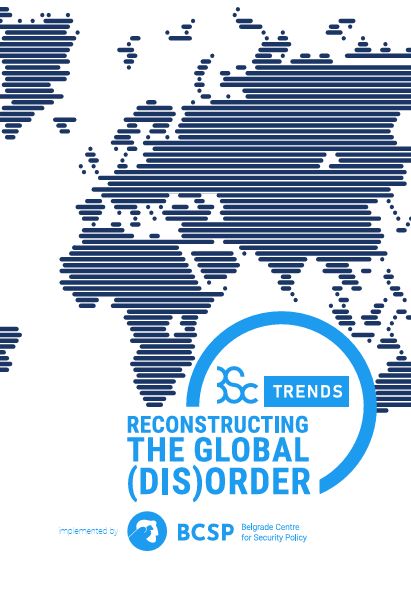
Keywords: European Union; power influence; global order; globalization; geopolitics; Balkans; international relations; EU enlargement; -wing politics; Europe; Ukraine conflict; Middle East
We proudly present you the ‘BSC Trends: Reconstructing the Global (Dis)Order,’ the companion publication to the Belgrade Security Conference 2023, held in Belgrade from October 11th to 13th, 2023. This publication aims to shed light on and discuss, following the style of BSC discussions, the most significant global, regional, and local events, phenomena, and developments that have marked this year. These topics were part of the panel discussions in this year’s BSC conference program.
More...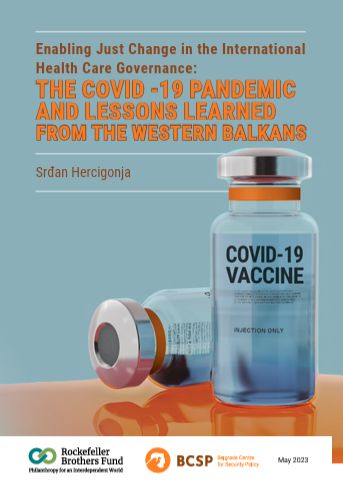
Keywords: pandemic management; Western Balkan; covid-19;
This publication comes after months of research conducted by the Belgrade Centre for Security Policy, in collaboration with its partners in the Western Balkans region - Kosovar Centre for Security Studies (Prishtina), Centre for Security Studies (Sarajevo), Institute Alternative (Podgorica), Institute for Democracy and Mediation (Tirana) and Institute for Democracy “Societas Civilis” (Skopje). The first stage focused on desk research over the course of nine months. Extensive desk research followed, with semi-structured interviews with public health experts conducted in order to assess the pandemic management in each of the Western Balkan countries – North Macedonia, Montenegro, Serbia, Kosovo, Albania, and Bosnia and Herzegovina.
More...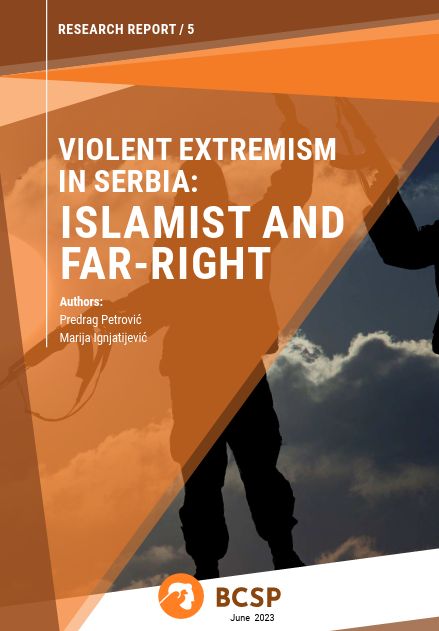
Keywords: Extremism; Serbia; Islamist; PREVEX project
Islamist extremism in Serbia is declining despite receiving significant attention, however, its non-violent forms have gained some traction in areas like Sanjak. On the other hand, political divisions signal a growing potential for political extremism in the region. In contrast, right-wing extremism is experiencing an upward trend, largely due to the Government's inaction and favourable media reporting. Upon conducting extensive research over five years, the research team aims to give an overview of the two major forms of extremism in Serbia. The first part focuses on the roots, occurrence, and ideological basis of both the Islamist and right-wing extremism in the country. The next chapter aims to explain the international ties of extremist groups, including foreign fighters and other types of links and cooperation mechanisms with foreign extremist networks.
More...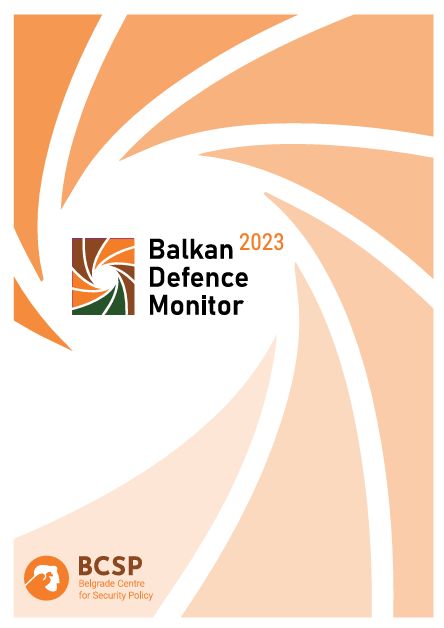
Keywords: transparency; defence policies; Western Balkans; European security
The main policy purpose of the Balkan Defence Monitor remains the same as in the last year. In recent years, the local elites have misused the lack of transparency related to defence policies in the Western Balkans, turning the military into a tool of domestic political promotion rather than a public good. This model of behaviour did not cause an armed conflict, and it is unlikely that it will do so in the future. However, it has poisoned the already fractious political ties between the countries of the region and fostered an atmosphere of distrust. To counter these negative occurrences, data on the defence sector needs to be made accessible to the citizens of Western Balkan countries and the international community. The ongoing war in Ukraine and the destabilisation of the European security environment make such an approach even more relevant.
More...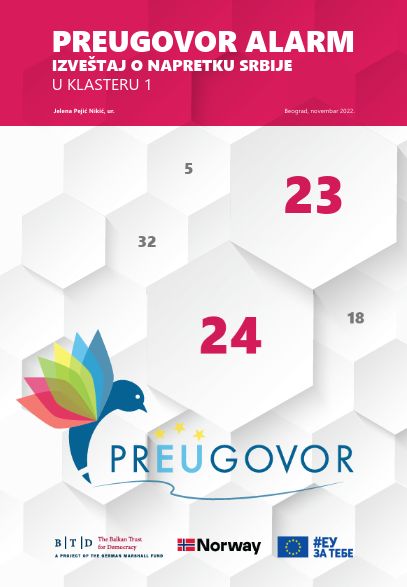
Keywords: PrEUgovor; prEUnup; European Union;
The reporting period – from May to October 2022 – Serbia spent with the Government in a technical mandate. The formation of the Government that should act as an engine of European integration waited until the deadline, even though the parliamentary majority was clear and the international and domestic circumstances demanded decisive action. Most of the reform activities in Cluster 1 have therefore been put on hold, starting with the drafting and adoption of regulations. Serbia is still far from achieving visible results in the areas monitored by the prEUgovor coalition. Moreover, in the previous six months, even the hitherto prevailing approach of “ticking the boxes”, i.e. piling up activities to feign reform efforts, was absent. The rule of law is temporarily marginalized by geopolitical considerations due to the consequences of Russian aggression against Ukraine and strained relations between Belgrade and Priština. Still, it remains at the core of European integration.
More...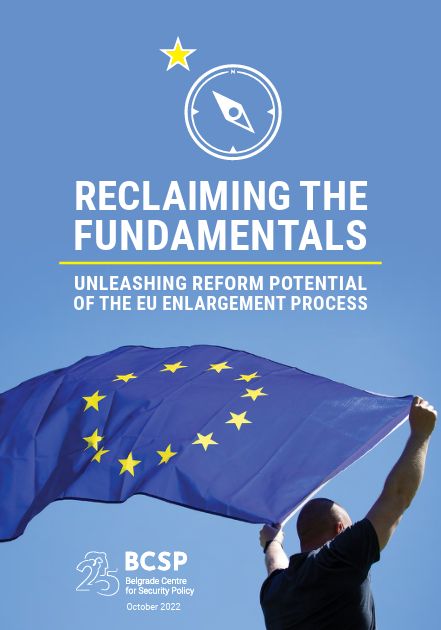
Keywords: accession process; Western Balkans; stabilocracy
The accession process so far has been both technically and politically flawed in attempting to be the driver of the transformation in the Western Balkans that would generate changes tangible for the citizens and contribute to the development of functional democracies in the region. The lack of will and convincing strategies for accelerating enlargement has been paired with the support for stabilocracy, the dominant EU approach in the last decade, which prioritized stability over reforms. The consequence of this strategy has been the region steadily becoming both less secure and less democratic, with once unquestionable European credibility and influence progressively eroding.
More...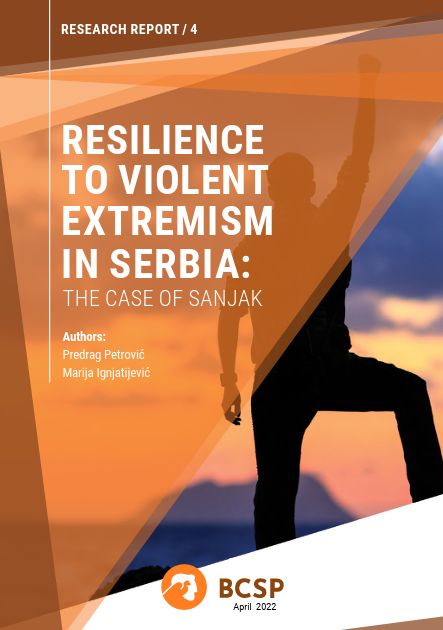
Keywords: Challenges Risks and Threats; Extremism; Islamist extremism
Many experts had gloomy forecasts about violent Islamist extremism and terrorism in Serbia. Sanjak – the southwest region in Serbia populated by Muslim majority – was even dubbed Jihadist hotbed, as it was the center for further spreading ultra-conservative Salafism from the neighboring Bosnia and Herzegovina into Serbia, and a region where the recruitment of Syrian foreign fighters took place. Among the most influential militant Salafi leaders in Vienna who maintained contacts with ISIS there were individuals from Sanjak. However, despite these forecasts and the presence of both push and pull factors of violent extremism, Sanjak has proved to be very resilient to violent Islamist extremism. Compared to other countries in the Western Balkans, a relatively small number of people from Serbia (49 of them including women and children) joined militant Islamist groups in Syria. Only a few incidents involving militant Salafis and failed terrorist plots happened. People in Sanjak showed both resilience to violent extremism and to the spread of the ultra-conservative interpretation of Islam.
More...